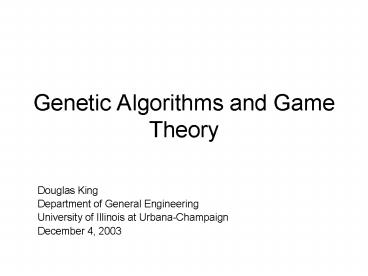Genetic Algorithms and Game Theory - PowerPoint PPT Presentation
1 / 9
Title:
Genetic Algorithms and Game Theory
Description:
Search/Optimization method inspired by genetic/evolutionary theory ... Genetic algorithm as an evolutionary game. Many agents who interact with each other ... – PowerPoint PPT presentation
Number of Views:120
Avg rating:3.0/5.0
Title: Genetic Algorithms and Game Theory
1
Genetic Algorithms and Game Theory
- Douglas King
- Department of General Engineering
- University of Illinois at Urbana-Champaign
- December 4, 2003
2
Overview
- What is a genetic algorithm?
- Axelrod Using the genetic algorithm to develop
successful strategies in the iterated prisoners
dilemma - Riechmann Genetic algorithm as a game, itself
3
What is a Genetic Algorithm?
- Search/Optimization method inspired by
genetic/evolutionary theory - Maintains a collection (population) of solutions
rather than just one - These solutions (strategies) are represented as
strings of bits (chromosomes) - Population evolves using three genetic operators
- Selection Survival of the fittest
- Mutation Random bit-flip (probabilistic)
- Crossover Combine two chromosomes (probabilistic)
4
Axelrod Iterated Prisoners Dilemma (IPD)
- Equilibrium when both defect, but both will do
better if they cooperate - Background Axelrods tournaments
- TIT-FOR-TAT wins both tournaments
- Desirable strategy characteristics
- Niceness
- Vengefulness
- Forgiveness
Figure 1 Payoff Matrix
5
Axelrods GA Approach
- Strategies have three-turn memory
- Strategies coded as strings of 70 bits
- 64 for the possible three-turn combinations
- 6 for the initial conditions
- Fitness determined by performance against
Kingmakers from second tournament - Population size of 20
- Experiments run for 50 generations
6
GA Experiment Results
- GA evolves TIT-FOR-TAT-like behavior over time
- Niceness Continue to cooperate after three
rounds of mutual cooperation - Vengefulness Defect when opponent breaks a
sequence of mutual cooperation - Forgiveness Cooperate when opponent appears to
apologize for defection
7
Some Concerns
- Axelrod Would these GA-strategies do as well in
a different environment? - Is GA population size too small?
- Note Chromosome can only represent a small
subset of strategies - Memory increases chromosome size exponentially
- Nevertheless, these results show promise
8
Riechmanns Analysis of the GA
- Genetic algorithm as an evolutionary game
- Many agents who interact with each other
- Fitness based on how well agents play the game
- More advanced conditions
- Population as a group of agents trying to achieve
Nash equilibrium - Agents play against all other agents
- HOWEVER Population does not represent every
strategy
9
Summary
- The field of genetic algorithms is closely
related to the field of game theory - Applications Axelrod
- Theoretical Riechmann
- Further examination of the links between these
fields could provide a greater understanding































